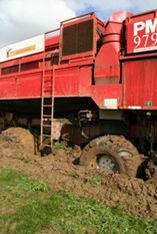
While all outdoor vegetable and salad crops throughout the country have suffered damage from the wet weather in May and June, maincrop potatoes appear to have suffered among the worst.
The final assessment of losses will only be accurately measured when the crops have completed harvesting in October, but the situation is poor at best and for many, their situation is serious.
“We don’t know yet the extent of the losses and how that will affect their future,” said Graham Nichols of the NFU Board for Horticulture, who grows 230 acres of potatoes near Gloucester.
There is a concern that after the difficulties of this year growers might well go for growing the less demanding crops, such as cereals.
His problems have not been so severe because he is on good quality high ground, and has been able to keep on top of the massive blight infection this season.
He said the main effect for those growers who were able to get on their land to spray - and many couldn’t - was that there would be a massively detrimental effect on storage. Already there are many cases of growers able to harvest their crop but having to sell straight for retail use.
Nichols added that Willy Chase, who founded Tyrell Crisps, has lost 40 percent of his potato crop in Herefordshire. Another local grower with his own farm shop has lost his entire crop.
He added further that there were reports of the small number of organic potato growers losing their entire crop. What has annoyed nearby conventional potato growers is the fact that these crops are a massive reservoir for blight infection.
But other outdoor crops have also been affected, including the already harvested peas. Stephen Francis, managing director, of the co-operative Fen Peas, Boston Lincolnshire, has been very badly affected with huge losses on peas with just over half a crop gone.
Francis has roughly estimated that potentially he has a 75 percent cauliflower crop and 60 percent broccoli crop. Cabbages are better with an expected 80 percent crop, with sprouts very difficult to assess, but extremely variable.



